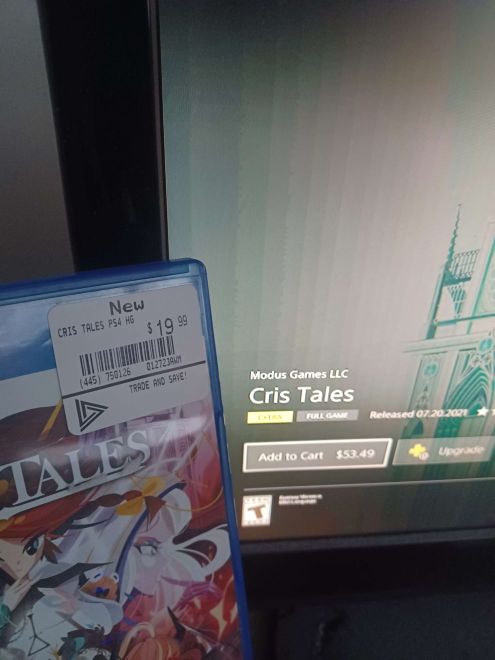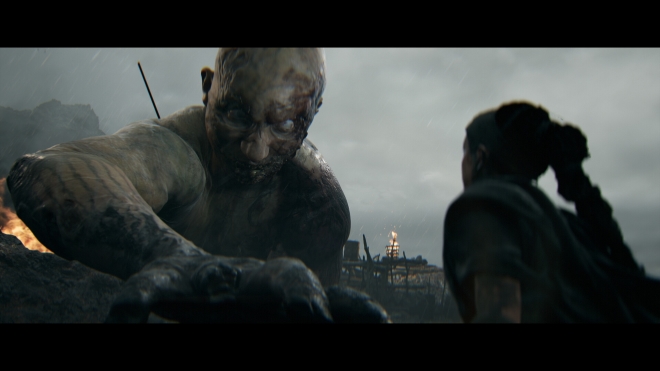Random Roar: Physical Media is Not Dead

In recent weeks, it’s become quite clear that the powers that be want to take away our ability to own what we buy. They want to be able to delete our PlayStation 5’s television library on a whim, no doubt so that they can charge us even more money to get those shows back on a different device. They want to get us used to the idea that we don’t own the games we buy. We’re basically meant to be infinite money farms for these people so that they can exploit us for greater and greater profits.
One of the biggest obstacles between them and their goals is that the market for physical media still exists, and may possibly be on the rise once more depending on how much Warner Bros. Discovery pissed everyone off in its first two years of operation. Between the cancellation of finished projects in 2022 to the deletion of many IPs from their streaming services to the attempted deletion of their back catalog from the PlayStation Network, they’ve perhaps tipped their hand a little early. Not only have they made the existence of physical options look much more valuable than digital options, I’m willing to bet that there are many people who got re-sold on the idea of physical media after having given it up for a supposedly more convenient digital option.
The thing about the digital option is that it’s only as good as the availability of what you’re trying to watch. It’s one thing to want to watch Star Trek, because that show is everywhere (here in Canada, anyway). It’s free on CTV’s service, it’s on Netflix, it’s on Paramount+, there’s even a season on Pluto for anyone who actually uses Pluto.
However, it’s another thing entirely if you want to watch Loki, as it’s only available on Disney+. If Disney goes down for any reason and you really wanted to watch it, you’re pretty much out of luck.
This is why physical media is so important. When we’re paying money to Disney+ or Netflix, we’re only paying to access a library of content, we’re not paying to own that content. Season one of Loki is available on Bluray, so if the show were to suffer from the same fate as season one of Willow some time in the future, at least fans can still enjoy it, which is more than can be said about Willow.
It doesn’t help that physical media is so inconsistently released. Last week on Quarantine Control, I outlined how Disney has failed to fully back up the Disney Afternoon on physical media, leaving several shows fractured and incomplete, and how other studios aren’t doing any better. The same can be said about the Marvel shows that were developed for Netflix. As of this writing, two seasons of Daredevil out of the three produced are available on DVD and Bluray, along with one season of Jessica Jones out of the three produced, one season of Luke Cage out of the two produced, one season of Iron Fist out of the two produced, and that’s it. The Defenders never got an official release and nor did The Punisher, leaving eight out of thirteen seasons to vanish into the void completely if Disney decides to stop hosting them on their service.
I wouldn’t be so against digital media if it were merely an option as opposed to the only option in many cases. That said, physical media is also not as dead as you’d think. As an example, I’m happy to report that the new Star Trek shows are all available on physical media, although they are a bit slower to come out in regions outside of North America.
I’ve seen DVDs and CDs mentioned as places where people are already happy to give up ownership of their content, but I don’t think that’s the case. Ubisoft’s director of subscriptions, Philippe Tremblay, deliberately chose movies and music as examples of “giving up ownership” due to the presence of Netflix and Spotify, but physical copies of movies and music are still selling despite that it’s cheaper to buy digitally and cheaper still to stream. Also, was Tremblay not paying attention last month when people almost lost their digital Discovery content? We are not as content to give up ownership as he claims. And lest we forget, back in 2009, Amazon deleted copies of 1984 from peoples’ Kindles that had not been properly licensed for distribution and they were still forced to take one on the chin when enough people complained. People are definitely not happy to give up ownership of content just because they stream the latest season of Stranger Things on day one and pounce on Spotify as soon as any new music from their favourite band gets released.

Another reason I dislike the big push for digital media to take over is that a lot of this push is coming from the video game industry, where digital games can be (and often are) more expensive than physical copies of the exact same game. I bought a physical copy of Cris Tales brand new for $19.99, and it currently costs $53.49, digitally (all prices in this article are Canadian). The digital future is very much not in our favour, because there’s no incentive to lower the price outside of occasional sales, unless it’s a game that’s been released as a part of a series and the developers know that the newer titles devalue older ones just by virtue of existing. I figure that’s the only reason Final Fantasy VII Remake costs $39.99 now instead of its much more expensive $79.99 price tag from less than half a year ago, because Rebirth is coming out soon and they probably don’t like how it looks for brand new players to have to pay a total of about $160 for what is pretty much less than two thirds of Final Fantasy VII. What incentive do I have to buy it digitally? Because I can have the game faster? New games cost the same digitally as they do physically, so I feel like they’re stealing a game disc from me if I buy digitally. I’ll buy digitally to support indie developers who literally can’t afford to release a physical copy of their game, but if you’re a triple-A developer, you owe me a disc.
This is pretty much why I refused to buy Alan Wake II despite liking the first game.
It’s worse in Australia, where the price of a digital game used to include the extra import fees that always had to be added to physical copies of games. Any promises that buying digitally allows publishers to keep the price of games as low as possible are lies when you realize that if they feel they can get away with charging more, publishers will, and they’ll shift the blame as much as they can. Publishers used to blame the value of the Australian Dollar until it improved, then they claimed that they were using different ad campaigns in Australia until it was proven that they weren’t, then they blamed the import taxes. Import taxes don’t pertain to digital goods, though, and apparently prices have been slowly creeping downward in recent years, but it’s always a slow process and I imagine the executives making these decisions are being pulled through the dirt every step of the way rather than making these decisions freely and gladly like we wish they’d do. I’ve noticed here in Canada that the price of books and magazines goes up by a dollar or more pretty quickly after the Canadian Dollar takes a nosedive, many times with obvious stickers covering up the lower price, but when its value improves, it takes those same books and magazines several months before they return to their previous price point. The claim is always that they’re published months in advance, but that sure doesn’t stop the higher price from showing up almost supernaturally fast and clearly having been added after the fact.
Getting back to physical media not being dead, it was recently widely reported that Walmart was throwing out unsold copies of Starfield and it was feared that this was the opening salvo of a longer war against physical media, but it was eventually confirmed that this is only what they do when a new version of the game is being made available. Those details were withheld from the initial leak, though, and given how soon after the Discovery on PlayStation debacle this was leaked, of course everyone overreacted and considered it another sign that the higher ups were trying to force us to leave all of our physical goods behind to enter digital Valhalla. I’m not saying they don’t want us to, I’m just saying that we’ve yet to reach that point.
At this point, all that can really be done to prevent an all digital future where we no longer own the media we buy is to continue to buy physical media when we can afford it. We should also try to keep the used market alive as much as possible, although with certain consoles, that can prove challenging. Both the Wii U and the 3DS have weird issues with longevity where the Wii U will just fail randomly if you don’t use it for a while, and 3DS game cards reportedly do the same thing. Any console with robust on-line support tends to also feature incomplete or buggy games that require patches, so if you buy a used game for one of these systems, always try it out and download the patches as soon as you can so that when you do have time to play it, you can play the best possible version of it. As of right now, I don’t think anyone is planning to shut down the servers that deliver patches for older PlayStation or Xbox software, but somewhere down the line, someone will look at the cost of hosting patches for PlayStation 3 games and think, “Why are we spending this money when no one uses these any more?” I suppose I should also say, then, that if you’re bored with your current generation games, perhaps consider playing some of your games from one to two generations ago. I’m sure companies like Sony keep track of how often the software is used and how many trophies pop every month.
The biggest thing we can do is to keep vigilant and try to push back whenever a company announces something that is clearly bad for consumers and only good for the company. Forcing Sony to backpedal regarding Discovery content was great, but we need to keep that up and make sure that these companies understand that if they don’t want to actually sell us ownership over anything, maybe we don’t owe them anything either.



